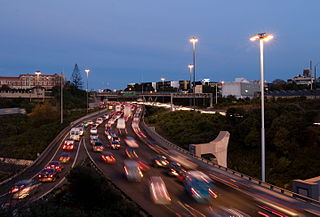
The Mitsubishi Fuso Truck and Bus Corporation is a manufacturer of trucks and buses. It is headquartered in Kawasaki, Kanagawa, Japan. Currently, it is 89.29% owned by Germany-based Daimler Truck.

A coach is a bus used for longer-distance service, in contrast to transit buses that are typically used within a single metropolitan region. Often used for touring, intercity, and international bus service, coaches are also used for private charter for various purposes. Coaches are also related and fall under a specific category/type of RVs.

British Leyland was an automotive engineering and manufacturing conglomerate formed in the United Kingdom in 1968 as British Leyland Motor Corporation Ltd (BLMC), following the merger of Leyland Motors and British Motor Holdings. It was partly nationalised in 1975, when the UK government created a holding company called British Leyland, later renamed BL in 1978. It incorporated much of the British-owned motor vehicle industry, which in 1968 had a 40 percent share of the UK car market, with its history going back to 1895.

SBS Transit Ltd is a multi-modal public transport operator in Singapore operating bus and rail services. With a majority of its shares owned by Singaporean multinational transport conglomerate ComfortDelGro Corporation at 75%, it was formerly known as Singapore Bus Services before rebranding to SBS Transit on 1 November 2001.

Wrightbus is a Northern Ireland based bus manufacturer and a pioneer of the low-floor bus. The company was established in 1946 by Robert Wright and was run by his son William Wright.
Volgren is an Australian bus and coach body manufacturer.

The Volvo B7RLE is a low-entry single-deck bus chassis manufactured by Volvo. It was superseded by the Volvo B8RLE in 2013.

Duple Coachbuilders was a coach and bus bodybuilder in England from 1919 until 1989.

The Volvo B10M was a mid-engined city bus and coach chassis manufactured by Volvo between 1978 and 2003. It succeeded the B58 and was equipped with the same 9.6-litre horizontally mounted Volvo diesel engine mounted under the floor behind the front axle. An articulated version under the model name Volvo B10MA was also offered, as was a semi-integral version known as the C10M, with the engine in the middle of the chassis.

The New Zealand Railways Road Services (NZRRS) was a branch of the New Zealand Railways Department and later the New Zealand Railways Corporation. It operated long-distance, tourist and suburban bus services and freight trucking and parcel services. Its name was New Zealand Railways Road Motor Service until mid-1936.

The Plaxton Paramount was a design of coach bodywork built by Plaxton. It first appeared at the 1982 British Motor Show and was built until 1992.

Trolleybuses in Wellington were part of the Wellington public transport system from 1924 until 1932 and again from 1949 until 2017. It was the last trolleybus system operating commercially in Oceania and the last major system operating in a country where driving is on the left side of the road.
British Motor Corporation (Australia) was a motor manufacturing company formed in Australia in 1954 by the merger of the Austin Motor Company (Australia) and Nuffield (Australia). This followed the merger in 1952 of the Austin Motor Company and the Nuffield Group in the United Kingdom to form the British Motor Corporation. Following further corporate changes in the UK in the late 1960s, BMC Australia was absorbed into the newly established British Leyland Motor Corporation of Australia, the name of which became Leyland Motor Corporation of Australia in 1972, and then JRA Limited in March 1983.

Western Star Trucks Sales, Inc. is an American truck manufacturer headquartered in Portland, Oregon, and a subsidiary of Daimler Truck North America, which is in turn a wholly owned subsidiary of the Germany-based Daimler Truck.

The Leyland Royal Tiger Worldmaster, sometimes simply known as the Leyland Worldmaster, was a mid-underfloor-engined single-decker bus or single-decker coach chassis manufactured by Leyland between 1954 and 1979.
Bus Australia was an Australian interstate coach operator formed in 1985 when Volvo Trucks dealer Max Winkless from Perth linked Across Australia Coachlines with Briscoe's Coachlines and Quest Tours of Adelaide, and Perth based Parlorcars Group. In 1989 the east coast-based Intertour business was purchased with 27 coaches. In 1993 Bus Australia merged with Greyhound Australia and Ansett Pioneer to form Greyhound Pioneer Australia.

The automotive industry in New Zealand supplies a market which has always had one of the world's highest car ownership ratios. The distributors of new cars are essentially the former owners of the assembly businesses. At the dealership level they have maintained their old retail chains in spite of the establishment of the many new independent businesses built since the 1980s by specialists in used imports from Japan. Toyota entered into direct competition with those used-import businesses refurbishing old Toyotas from Japan and selling them through their own dealers as a special line. The nation's car fleet is accordingly somewhat older than in most developed countries.

Gemilang Coachwork Sdn Bhd ("GML") is a manufacturer of commercial vehicles including but not limited to buses and coaches. Based in Malaysia, GML specialises in designing and manufacturing bus bodies and the assembly of buses. GML is also one of the first companies in Malaysia to assemble fully electric buses.

The Volvo B8L is a 3-axle bus chassis, for double-decker buses, manufactured by Volvo Buses since 2018, with pre-production batches being produced as early as in 2016.

Hawke Coachwork Limited was a New Zealand bus and coach body manufacturer.


















